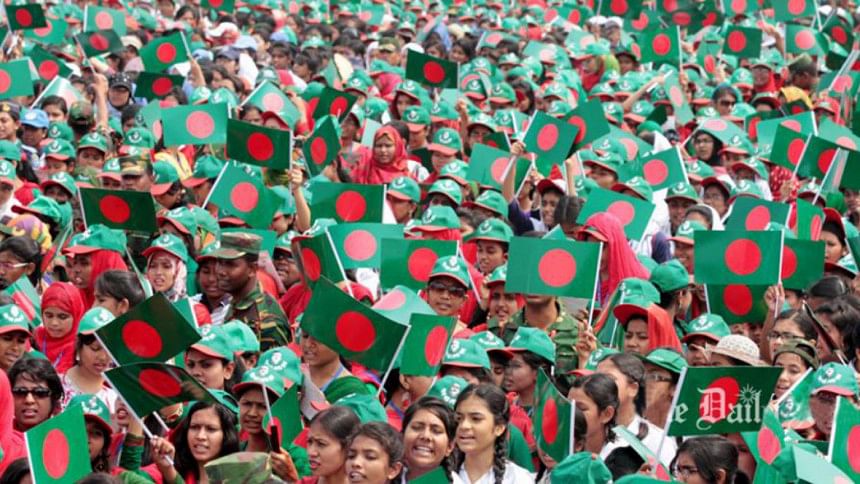Mixed fruit salad sweet and sour

Lately, three exceptional pieces of news must have grabbed your attention, even sprung pleasant surprises at you, not without a 'toxic' bit lacing them.
These are about a transformational change in our slums, Bangladesh's formal elevation to the lower middle income country bracket and our youth emerging as 'highly moral' in a finding by the Transparency International, Bangladesh (TIB).
Let me analyse them in an ascending order – from the baseline to a skyline-- of a conceptual framework so that you have a connective understanding of what the story is all about -- where we are now, how could we have bettered it, and where we need to refocus our priorities. All for a transparent, inclusive and sustainable development process secure from the vagaries of politics. These are major concerns with us.
A Bangladesh Bureau of Statistics' survey on slums reveals that in 17 years between 1997 and 2014, floating population has been halved from 32 thousand to 16 thousand and the number of jhupris (shacks) has dropped by as much as 75 percent.
There's been a significant improvement in the standard of living across the slums. 62.45 percent dwell in all tin or bamboo stick walled homes with thatch roof while a decent 26.43 percent in brick walled tin-roofed abodes. As many as 84 percent use mobile phones, 48 percent television sets, 79 percent cool off by electric fans. Sanitary toilet coverage has increased from 7.9 percent to 26.25 percent while the grimy hanging ones have dropped from 53.8 percent to 8.63 percent. Signs that they are slowly but steadily fending off the dreadful ghettoisation of mega cities. Our slums are only a push away from deliverance into an acceptably cleaner living.
The health and morbidity survey places them in a spot of bother, though fever is prevalent as communicable diseases are on the rise. Drinking water supply, largely self-managed, can be reasonably improved, sanitation and hygiene must be ensured by efficient garbage disposals, and affordable basic medicare made available around major slum concentrations.
The self-enterprising people deserve utmost material help from the government, NGOs and corporate sector considering that they are a lifeline to various services the citizenry cannot do without.
Now to our lower middle income status the World Bank has formally heralded Bangladesh into. We fulfill the lower end of the criterion for middle income country with a Gross National Income per capita (GNI) of between $1,046 to $4,125. Actually, it is a belated formalisation of our status; for, Bangladesh's per capita income has risen to $1,314.
It is quite relevant to pit our rising per capita income against capital flight through illicit means tripling in 2012 at $1.78 billion. Even this figure needs an update with statistics for the last three years adding to a more whopping total altogether. Capital flight to Switzerland, a financial haven, rose by 36.02 percent in 2014 alone reaching Tk 4,283 crore.
Capital flight from Bangladesh per capita amounted to $205 in 2010. Add to this, per capita debt burden which increased from Tk 2,982.19 in FY 2011-12 to Tk 3,389.84 in FY 2012-13. These potential add-ons couldn't be reflected on the per capita income calculations. Had the economy not suffered from these illicit outflows, let alone Bangladesh ranking among the top three countries after China and Japan to have citizens with second homes in Malaysia, we would have been firmly on course to next 11 emerging economies.
The answer is stabilising political order, good governance, consequently revamped security for investments.
Bangladesh has been ranked as the 35th largest economy of the world by the World Bank. The attainment is no less than a miracle and the prospects ahead holds a magical wand to turn copper nickels to gold coins, what with our blue economy assets. How can we possibly reconcile such bright possibilities with the real-time existence of so many ultra poor and slum-dwellers around us?
J.K. Galbraith had debunked the trickle down theory of economics as 'less than an elegant metaphor that if one feeds the horse enough oats, some will pass through to the road for sparrows'.
The diamond in our demographic crown is the youth. A TIB survey went ebullient with the finding that 97 to 98 percent of the youth surveyed reflected a strong sense of morality. 'A person of integrity never lies, cheats or break laws' as if that is their ideal, although 30 percent granted that such a person can make exceptions to bend over backwards if it benefits his or her family.
How does it fit in with reports that certain college student leaders ate in a restaurant and off they went without paying the bills? Having consequently suffered a minor mob beating they came back in strength for revenge and fell for car-bashing to let off their anger, as if the people owed them that much!
Student leadership once the gravitating point for just struggle has become a byword for extortionist forays and scramble for tender business.
The youth power is a potential agent of change for a better world. We have to give them work, a sense of purpose and opportunities to grow and advance. Otherwise, they will lack sense of importance and belief in self-worth, a lethal mix for them to go astray into taking drugs or be vulnerable to extremism. We have to whet their appetite for adventure, meet their creative urges and give them avenues for self-assertion.
The writer is Associate Editor, The Daily Star.

 For all latest news, follow The Daily Star's Google News channel.
For all latest news, follow The Daily Star's Google News channel. 



Comments